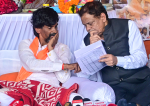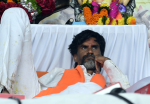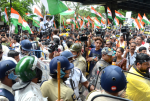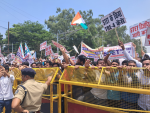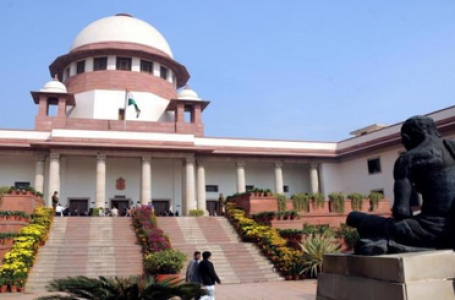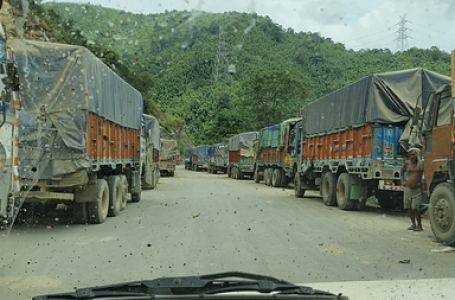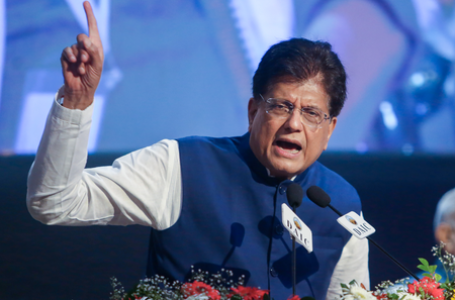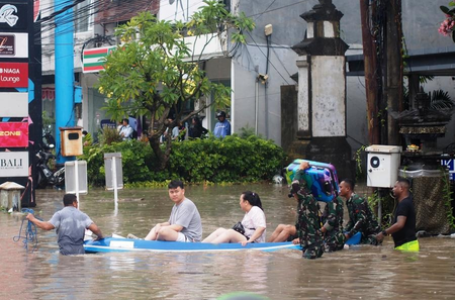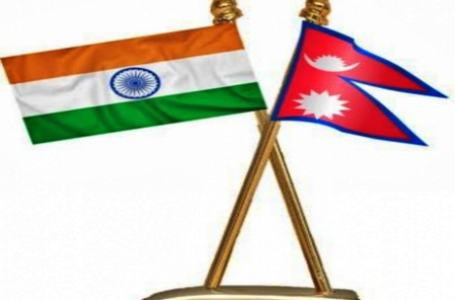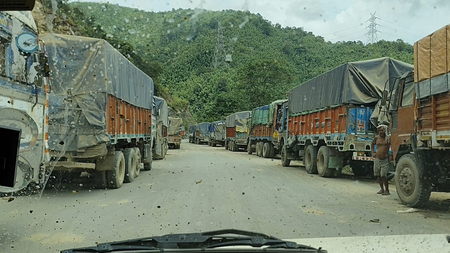
Imphal: The United Naga Council (UNC) in Manipur on Thursday announced the suspension of its “Trade Embargo” after the state government assured that tripartite talks would resume on issues related to the India-Myanmar border fencing and the scrapping of the Free Movement Regime (FMR).
The apex body of the Naga community in Manipur, UNC and other Naga organisations enforced the indefinite “Trade Embargo” in all Naga people inhabited areas since midnight of September 8 in protest against the fencing along the India-Myanmar international border and the scrapping of the FMR.
UNC’s Publicity and Information Secretary H. James Hau said that after receiving the Manipur government’s letter for resumption of tripartite meeting between the UNC, Ministry of Home Affairs (MHA) and the Manipur government on the issue of abrogation of FMR and border Fencing along the “imaginary India-Myanmar border in Naga areas”, an Emergency Presidential Council (EPC) meeting of the UNC was held on Thursday.
The EPC appreciated the Manipur government’s acknowledgement of the past engagement of the UNC and the MHA and also their confirmation of receipt of memoranda/representation on the issues, Hau said in a statement.
The UNC statement said the Manipur government’s assurance of prior consultation with the UNC and other stakeholders before starting the fencing works was well received at the EPC meeting.
The Presidential Council of the UNC, in its meeting held on Thursday at Tahamzam in Senapati district, resolved to suspend the ongoing “Trade Embargo” in Naga people inhabited areas temporarily with effect from 6 p.m. on Thursday, the statement said.
It said that the UNC appreciated all the tribe, women, student and youth organisations and the Naga public in general for their support and solidarity towards the effective observation of the Trade Embargo.
Earlier on Thursday, a senior official said that Manipur Chief Secretary Puneet Kumar Goel, in a letter to UNC President Ng. Lorho on Wednesday requested to withdraw their agitation in the larger public interest, and the MHA continued their discussion with the Naga bodies.
The Chief Secretary, in his letter to the UNC President, said: “MHA has been engaging with the UNC on the issue of fencing of the international border between India and Myanmar in Naga-inhabited areas. The state government has also received your memoranda and representations on the subject matter.”
“It is to inform that the Central government noted the concerns raised by the UNC and other stakeholders. Accordingly, the Central government has been holding and will continue to hold dialogue with the UNC and other stakeholders for prior consultation before fencing works are taken up. The next tripartite meeting with UNC will be held on a mutually convenient date and venue,” the letter said.
Meanwhile, officials of the MHA and leaders of three Naga groups, including UNC, held an inconclusive meeting in Delhi on August 26 over the demand for reinstatement of the old FMR and stoppage of the ongoing fencing along the India-Myanmar border.
The UNC had previously issued an ultimatum to the Central government and held a meeting with Manipur Governor Ajay Kumar Bhalla on August 16, and discussed the reinstatement of the old FMR and the stoppage of border fencing along 398 km of the India-Myanmar border with Manipur.
The UNC and other Naga bodies have been agitating in support of their demands since last year, opposing the “unilateral abrogation of FMR and construction of border fencing along the India-Myanmar border”.
Due to the “Trade Embargo” and stoppage of goods-laden vehicles, the supply of essentials and foodgrains to this Northeastern state from outside the state has been badly affected since Monday.
According to the Naga organisations, the government’s decision to fence the border and repeal the FMR would physically divide Naga tribes across Manipur, Nagaland, Arunachal Pradesh, and Myanmar, threatening their cultural identity, traditional and ancestral ties.
The MHA last year announced that the FMR, which earlier allowed people residing along the India-Myanmar border to travel 16 km into each other’s territory without a passport and visa, would be scrapped.
Instead, the MHA had decided to adopt a new scheme to issue a pass to the border residents of both India and Myanmar living within 10 km on either side of the frontier to regulate cross-border movements.
The Nagaland and Mizoram governments and a large number of political parties and civil societies in the two northeastern states have been strongly opposing both border fencing and the scrapping of the old FMR.
Four northeastern states — Arunachal Pradesh, Manipur, Nagaland, and Mizoram — share a 1,643-km unfenced border with Myanmar.
The MHA had earlier decided to put up fencing on the entire porous border, known for the smuggling of arms, ammunition, narcotics and various other contrabands, for Rs 31,000 crore.
IANS





